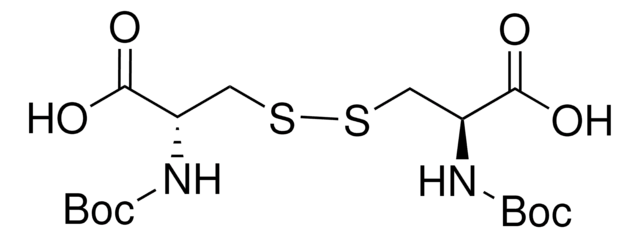410209
L-Cysteine methyl ester hydrochloride
98%, for peptide synthesis
Synonym(s):
(R)-Cysteine methyl ester hydrochloride
About This Item
Recommended Products
product name
L-Cysteine methyl ester hydrochloride, 98%
Assay
98%
form
solid
optical activity
[α]20/D −1.8°, c = 10 in methanol
reaction suitability
reaction type: solution phase peptide synthesis
mp
142 °C (dec.) (lit.)
application(s)
peptide synthesis
SMILES string
Cl[H].COC(=O)[C@@H](N)CS
InChI
1S/C4H9NO2S.ClH/c1-7-4(6)3(5)2-8;/h3,8H,2,5H2,1H3;1H/t3-;/m0./s1
InChI key
WHOHXJZQBJXAKL-DFWYDOINSA-N
Looking for similar products? Visit Product Comparison Guide
Storage Class Code
11 - Combustible Solids
WGK
WGK 2
Flash Point(F)
Not applicable
Flash Point(C)
Not applicable
Personal Protective Equipment
Certificates of Analysis (COA)
Search for Certificates of Analysis (COA) by entering the products Lot/Batch Number. Lot and Batch Numbers can be found on a product’s label following the words ‘Lot’ or ‘Batch’.
Already Own This Product?
Find documentation for the products that you have recently purchased in the Document Library.
Customers Also Viewed
Our team of scientists has experience in all areas of research including Life Science, Material Science, Chemical Synthesis, Chromatography, Analytical and many others.
Contact Technical Service










